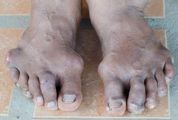THE gates of Nelson Mandela’s Maputo home are standing open, revealing comfortable deck chairs laid out under the shade of spreading jacaranda trees.
It is easy to imagine his being expected home at any moment. Outside, bouquets of roses left against a tree by passers by are a reality check: the man Mozambicans remember as Mozambique’s "brother-in-law" is gone.
"He was an honest person, a person with courage, a person who liked everyone and spoke to everyone," gardener Abraham Simbine remembers as he rakes petals from the jacaranda trees into neat piles. In the years the frail elder statesman spent at this other home in the Mozambican capital, Simbine worked inside the house as a cleaner. "He spoke to us, often. He spoke to us about work, after our health and our lives", Simbine remembers, evoking something often said of Mandela: that he cared about the "little" people more than the "big" ones. "He is in my heart," he says.
The years Mandela spent shuttling between South Africa and his wife, Graça Machel’s native country are a little-known chapter in an otherwise well-documented life. After leaving the limelight to Thabo Mbeki in 1999, Mandela began spending more and more time in Maputo. The couple, who were married on Mandela’s 80th birthday, built a luxurious, high-walled home next door to the prime minister’s residence and opposite the presidential compound.
These were Mandela’s twilight years and he seemed content to get to know Graça’s large family (who are as close to royalty as it gets in Mozambique) and watch his wife, 27 years his junior and still a force on Mozambique’s political and economic stage, attend to her development work and business interests. The story of how Mandela found happiness late in life with Mozambique’s former first lady is one the world knows, but their love story is also a tale of politics and personal history intertwined. Their story cannot be separated from that of Graça’s first marriage to Samora Machel, nor her quest to reveal the truth about her first husband’s death.
Graça met Machel, Mozambique’s iconic first president, when they were young fighters struggling for their country’s independence from Portugal. She married him in 1975, the year he became the country’s president. Their marriage lasted until October 19 1986 when the Tupolev aircraft carrying him back from a meeting in Zambia, mysteriously strayed off course, crashing into the Lebombo Mountains in neighbouring SA.
At the time, she received a condolence note from the Free State town of Brandfort. "Today we believe that our place was to be with you, physically," wrote Winnie Mandela. Living under house arrest, she had been denied permission to leave the country for the funeral. "Each of us is imprisoned in different jails," she added.
Initially too overcome by grief to reply, Graça eventually wrote back to the woman she would one day replace as Mandela’s wife: "Those who have locked up your husband are the same as those who have killed mine."
As fate would have it, two decades later Graça would become first lady of the very country she believed conspired to kill her husband. Despite their intertwined histories, it is doubtful the two men ever met. By the time Samora came to political prominence in 1970, Mandela was already imprisoned on Robben Island. On the level of ideas, they could not have been closer. Both believed in racial equality, both put their people first. Before his capture, trial and imprisonment, Mandela travelled to Ethiopia for a meeting of Pan-African leaders in 1962 where he spoke out against a "hideous conspiracy" between Portuguese colonial rule and apartheid SA.
After his release from prison, Mozambique was one of the first places he visited. Joaquim Chissano, the president at the time, jokingly presented him with a framed warrant for his arrest issued by Portuguese police during his years underground as the "Black Pimpernel."
The African National Congress (ANC) and Machel’s Marxist Frelimo party were a natural match and became even closer during Mandela’s incarceration. Frelimo’s willingness to harbour ANC operatives on Mozambican soil was one of the reasons Pretoria furnished its enemies, Renamo with weapons and support, fuelling a 13 year civil war that took a dreadful toll, killing over a million Mozambicans.
By the time of the 1986 crash, Samora was the "fly in the ointment from South Africa’s point of view," says Mozambican history expert, Colin Darch. Machel was backtracking on the Nkomati accord with Pretoria, made under duress, to curb ANC activities in Mozambique. The ANC was making inroads into the northern Transvaal and the Pretoria regime was desperate. Does that mean the regime conspired to murder him?
"I know it was them that assassinated him, everyone knows, but unfortunately I can’t prove it. South Africa has made me a widow and murdered the father of my children and that I cannot forgive," Graça said.
When exactly the relationship between the Machels and Mandelas shifted from the political to the personal realm is difficult to pinpoint. Increasingly after his release from prison, Mandela stepped into the role of adviser to the Machel family, taking over as godfather to his children after Oliver Tambo’s death in 1991. After his divorce from Winnie in 1996 the romance became public when journalists spotted them holding hands in Paris.
The two were married in 1998 on Mandela’s 80th birthday and travelled to Mozambique for a traditional blessing.
Mozambicans, who would come to refer to Mandela as "cunhado" or brother-in-law, at first had some difficulty accepting that Samora’s widow, "Mama Machel" could replace him, even with someone with Mandela’s stature.
"People said: ‘How? She is still young and he was already an old man‘," remembers Paolo Nhacula, one of Samora’s proteges.
"Others said: ‘Aren’t there enough men here? ’ Others believed, maybe she went there (South Africa) to find out who killed her husband."
A common theory held by Mozambicans is that, in marrying Mandela, Graça would be able to access state secrets, at least in private, but Graça has insisted that the answers still elude her.
"Nelson Mandela, Thabo Mbeki, President Chissano … I spoke to them all. I have asked these questions in private a million times. I am now so desperate I would pay for this information," Graça said in an interview with Mozambican TV station Socio Televisao in 2012.
South Africa’s Truth and Reconciliation Commission held an in-camera session on the crash in 1998. The commission said "serious questions" remained unanswered. A succession of inconclusive international enquiries followed the crash, but a 1997 enquiry led by South African judge Cecil Margo pointed to pilot fatigue, discounting the theory that a false beacon had lured the aircraft off course.
Late last year Hawks investigators announced they had reopened investigations into the crash. There has been no news since.
"It is not just Graça," says Nhacula, "Mozambicans need to know."
So profound was the shock of Samora’s death that people say a silence enveloped Mozambique for two days afterwards. A life cut short ate the age of 53, Samora’s was an unfinished story. The idealistic vision he had for a future Mozambique was left unfulfilled.
It is common to find people listening to recordings of his speeches in their cars, and to hear the phrase, "Samora lives in each one of us". Every perceived failure of the current ruling elite is measured against his example.
By contrast, South Africa and the world had time to honour Mandela while he was alive, and had ample time to prepare for his passing at the age of 95. A similarity is that Mandela’s example, like Machel’s, has not been an easy one for his successors to live up to.
Nor will his loss be easy for South Africans to come to terms with. Graça, at least, got to see her second husband’s remarkable story reach its graceful conclusion.

Former president Nelson Mandela waves to the crowd at Soccer City stadium during the closing ceremony for the 2010 World Cup in Johannesburg in this July 11 2010 file photo. Picture: REUTERS
THE gates of Nelson Mandela’s Maputo home are standing open, revealing comfortable deck chairs laid out under the shade of spreading jacaranda trees.
It is easy to imagine his being expected home at any moment. Outside, bouquets of roses left against a tree by passers by are a reality check: the man Mozambicans remember as Mozambique’s "brother-in-law" is gone.
"He was an honest person, a person with courage, a person who liked everyone and spoke to everyone," gardener Abraham Simbine remembers as he rakes petals from the jacaranda trees into neat piles. In the years the frail elder statesman spent at this other home in the Mozambican capital, Simbine worked inside the house as a cleaner. "He spoke to us, often. He spoke to us about work, after our health and our lives", Simbine remembers, evoking something often said of Mandela: that he cared about the "little" people more than the "big" ones. "He is in my heart," he says.
The years Mandela spent shuttling between South Africa and his wife, Graça Machel’s native country are a little-known chapter in an otherwise well-documented life. After leaving the limelight to Thabo Mbeki in 1999, Mandela began spending more and more time in Maputo. The couple, who were married on Mandela’s 80th birthday, built a luxurious, high-walled home next door to the prime minister’s residence and opposite the presidential compound.
These were Mandela’s twilight years and he seemed content to get to know Graça’s large family (who are as close to royalty as it gets in Mozambique) and watch his wife, 27 years his junior and still a force on Mozambique’s political and economic stage, attend to her development work and business interests. The story of how Mandela found happiness late in life with Mozambique’s former first lady is one the world knows, but their love story is also a tale of politics and personal history intertwined. Their story cannot be separated from that of Graça’s first marriage to Samora Machel, nor her quest to reveal the truth about her first husband’s death.
Graça met Machel, Mozambique’s iconic first president, when they were young fighters struggling for their country’s independence from Portugal. She married him in 1975, the year he became the country’s president. Their marriage lasted until October 19 1986 when the Tupolev aircraft carrying him back from a meeting in Zambia, mysteriously strayed off course, crashing into the Lebombo Mountains in neighbouring SA.
At the time, she received a condolence note from the Free State town of Brandfort. "Today we believe that our place was to be with you, physically," wrote Winnie Mandela. Living under house arrest, she had been denied permission to leave the country for the funeral. "Each of us is imprisoned in different jails," she added.
Initially too overcome by grief to reply, Graça eventually wrote back to the woman she would one day replace as Mandela’s wife: "Those who have locked up your husband are the same as those who have killed mine."
As fate would have it, two decades later Graça would become first lady of the very country she believed conspired to kill her husband. Despite their intertwined histories, it is doubtful the two men ever met. By the time Samora came to political prominence in 1970, Mandela was already imprisoned on Robben Island. On the level of ideas, they could not have been closer. Both believed in racial equality, both put their people first. Before his capture, trial and imprisonment, Mandela travelled to Ethiopia for a meeting of Pan-African leaders in 1962 where he spoke out against a "hideous conspiracy" between Portuguese colonial rule and apartheid SA.
After his release from prison, Mozambique was one of the first places he visited. Joaquim Chissano, the president at the time, jokingly presented him with a framed warrant for his arrest issued by Portuguese police during his years underground as the "Black Pimpernel."
The African National Congress (ANC) and Machel’s Marxist Frelimo party were a natural match and became even closer during Mandela’s incarceration. Frelimo’s willingness to harbour ANC operatives on Mozambican soil was one of the reasons Pretoria furnished its enemies, Renamo with weapons and support, fuelling a 13 year civil war that took a dreadful toll, killing over a million Mozambicans.
By the time of the 1986 crash, Samora was the "fly in the ointment from South Africa’s point of view," says Mozambican history expert, Colin Darch. Machel was backtracking on the Nkomati accord with Pretoria, made under duress, to curb ANC activities in Mozambique. The ANC was making inroads into the northern Transvaal and the Pretoria regime was desperate. Does that mean the regime conspired to murder him?
"I know it was them that assassinated him, everyone knows, but unfortunately I can’t prove it. South Africa has made me a widow and murdered the father of my children and that I cannot forgive," Graça said.
When exactly the relationship between the Machels and Mandelas shifted from the political to the personal realm is difficult to pinpoint. Increasingly after his release from prison, Mandela stepped into the role of adviser to the Machel family, taking over as godfather to his children after Oliver Tambo’s death in 1991. After his divorce from Winnie in 1996 the romance became public when journalists spotted them holding hands in Paris.
The two were married in 1998 on Mandela’s 80th birthday and travelled to Mozambique for a traditional blessing.
Mozambicans, who would come to refer to Mandela as "cunhado" or brother-in-law, at first had some difficulty accepting that Samora’s widow, "Mama Machel" could replace him, even with someone with Mandela’s stature.
"People said: ‘How? She is still young and he was already an old man‘," remembers Paolo Nhacula, one of Samora’s proteges.
"Others said: ‘Aren’t there enough men here? ’ Others believed, maybe she went there (South Africa) to find out who killed her husband."
A common theory held by Mozambicans is that, in marrying Mandela, Graça would be able to access state secrets, at least in private, but Graça has insisted that the answers still elude her.
"Nelson Mandela, Thabo Mbeki, President Chissano … I spoke to them all. I have asked these questions in private a million times. I am now so desperate I would pay for this information," Graça said in an interview with Mozambican TV station Socio Televisao in 2012.
South Africa’s Truth and Reconciliation Commission held an in-camera session on the crash in 1998. The commission said "serious questions" remained unanswered. A succession of inconclusive international enquiries followed the crash, but a 1997 enquiry led by South African judge Cecil Margo pointed to pilot fatigue, discounting the theory that a false beacon had lured the aircraft off course.
Late last year Hawks investigators announced they had reopened investigations into the crash. There has been no news since.
"It is not just Graça," says Nhacula, "Mozambicans need to know."
So profound was the shock of Samora’s death that people say a silence enveloped Mozambique for two days afterwards. A life cut short ate the age of 53, Samora’s was an unfinished story. The idealistic vision he had for a future Mozambique was left unfulfilled.
It is common to find people listening to recordings of his speeches in their cars, and to hear the phrase, "Samora lives in each one of us". Every perceived failure of the current ruling elite is measured against his example.
By contrast, South Africa and the world had time to honour Mandela while he was alive, and had ample time to prepare for his passing at the age of 95. A similarity is that Mandela’s example, like Machel’s, has not been an easy one for his successors to live up to.
Nor will his loss be easy for South Africans to come to terms with. Graça, at least, got to see her second husband’s remarkable story reach its graceful conclusion.


















